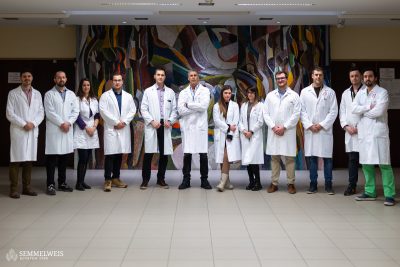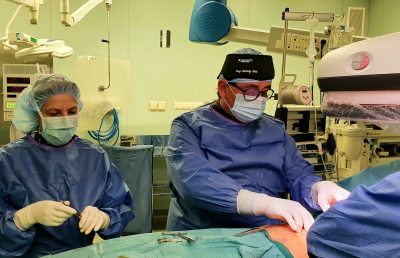The primary objective of the Brain Metastasis Research Group lead by Dr. Zoltán Szállási, guest professor at the 2nd Department of Pathology is the better understanding of the genetic background of brain metastases, their genomic analysis and the establishment of a tissue archive. The first results of the team, made up of researchers from various departments, have recently been published in the scientific journal Neuro-Oncology. Dr. Judit Moldvay, senior author of the paper and leader of the clinical division of the team said that the analysis of sample brain tissues from lung cancer patients revealed certain characteristics that could point to the evolution of the disease.
The recently published study discusses the analysis of sample brain tissues obtained from the surgical removal of cerebral metastases of lung cancer patients. The paper focuses on the expression of the proteins PD-L1/PD-1, which are researched worldwide for their predictive properties in immunotherapy.
 “These proteins are significant building blocks of the immune system, they can be detected in tumours, moreover, their presence in tumour cells and lymphocytes seems to be related to the reaction to immunotherapy.”, said Dr. Judit Moldvay, chief physician of the Department of Tumourbiology at the Hungarian Korányi Institute of Pulmonology and former assistant professor of Semmelweis University’s Department of Pulmonology.
“These proteins are significant building blocks of the immune system, they can be detected in tumours, moreover, their presence in tumour cells and lymphocytes seems to be related to the reaction to immunotherapy.”, said Dr. Judit Moldvay, chief physician of the Department of Tumourbiology at the Hungarian Korányi Institute of Pulmonology and former assistant professor of Semmelweis University’s Department of Pulmonology.
The results suggest that patients, whose brain metastases show certain histological properties (eg. mononuclear rings around the metastasis), will have better chances of survival after brain surgery. A higher number of lymphoid cells in the metastasised tumour also showed a better tendency for survival, which was not influenced significantly by steroid administration and chemotherapy.
The results may be used in clinical practice in the future. For instance if a cancer tissue is found without these favourable properties, the tumour is supposedly of an aggressive type, therefore the patient needs closer monitoring.
 The head of the research group is Dr. Zoltán Szállási, a researcher at Harvard Medical School in Boston, who came to lead the team on the invitation of Dr. József Tímár, Director of the 2nd Department of Pathology. He wanted to create a team that could improve the diagnostics and therapy of brain metastases of various tumours with the help of basic research. This requires the close cooperation of specialists from different areas, therefore clinicians, pathologists, molecular biologists and surgeons work together on the project.
The head of the research group is Dr. Zoltán Szállási, a researcher at Harvard Medical School in Boston, who came to lead the team on the invitation of Dr. József Tímár, Director of the 2nd Department of Pathology. He wanted to create a team that could improve the diagnostics and therapy of brain metastases of various tumours with the help of basic research. This requires the close cooperation of specialists from different areas, therefore clinicians, pathologists, molecular biologists and surgeons work together on the project.
Dr. Lilla Reiniger, senior lecturer at the 1st Department of Pathology and Cancer Research is a neuropathologist who is assisted by her PhD student, Dr. Vanda Téglási. Dr. Laura Vízkeleti, research fellow at the 2nd Department of Pathology is a molecular biologist and Dr. Attila Bagó, chief neurosurgeon at the National Institute of Clinical Neurosciences provides the project with samples. Dr. Judit Moldvay is a pulmonologist-oncologist assisted by her PhD student, Dr. Katalin Fábián. Statistical analysis and evaluation is carried out by Orsolya Pipek, doctoral student at Eötvös Loránd University.
 The research is based on an extensive tissue database which consists of frozen tissue samples from primary lung tumours and cerebral metastases. This archive provides a basis for the comparative molecular genetic analysis of the primary tumour and its metastasis in the brain. The team have already stared the process of genetic sequencing which will lead to the better understanding of the complex molecular mechanisms of cerebral metastatisation and the role of the immune system in metastatisation in the brain. All this could lead to a better selection of patients and a more efficient therapy of lung cancer.
The research is based on an extensive tissue database which consists of frozen tissue samples from primary lung tumours and cerebral metastases. This archive provides a basis for the comparative molecular genetic analysis of the primary tumour and its metastasis in the brain. The team have already stared the process of genetic sequencing which will lead to the better understanding of the complex molecular mechanisms of cerebral metastatisation and the role of the immune system in metastatisation in the brain. All this could lead to a better selection of patients and a more efficient therapy of lung cancer.
Part of the tissue archive is located at the Korányi Institute where primary tumour samples are collected by Dr. Attila Vágvölgyi, thoracic surgeon and Dr. János Fillinger, pathologist. The tissue database containing the samples from cerebral metastases is located at the National Institute of Clinical Neurosciences. All together 350 primary and 150 metastatised samples have been collected in two years.
“Unfortunately, the reason behind the extensive study of lung cancer with metastatisation to the brain is the alarming statistics. Globally, the occurrence and the mortality rate of lung cancer in males are the highest in Hungary.”, Dr. Judit Moldvay said.
In nearly half of the patients metastatisation to the brain occurs, which is the leading cause of death in case of malign tumours. Therapies are less efficient because the genetics of cerebral metastases and the change in their evolution from the primary tumour are barely known. The research group aim to explore this area and help patients by the further improvement and application of the tissue banks.
Pálma Dobozi
Photo: Attila Kovács, Semmelweis University
Translation: Ágnes Raubinek


